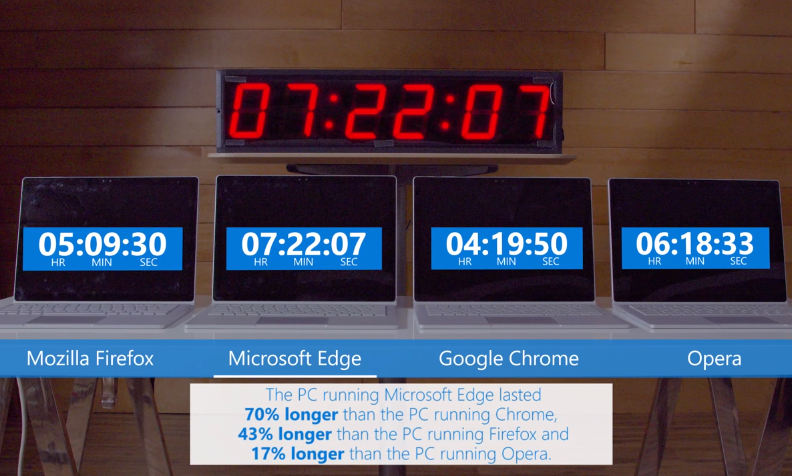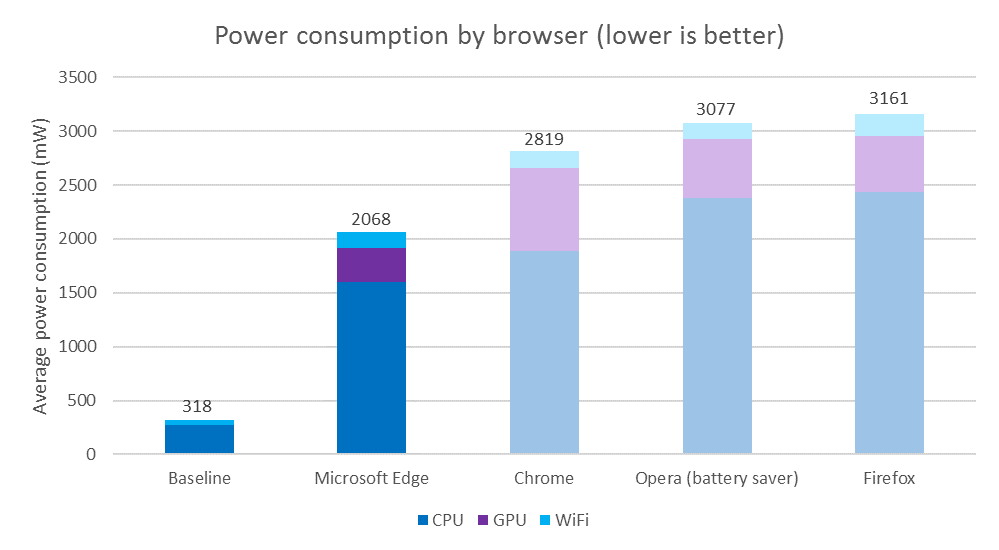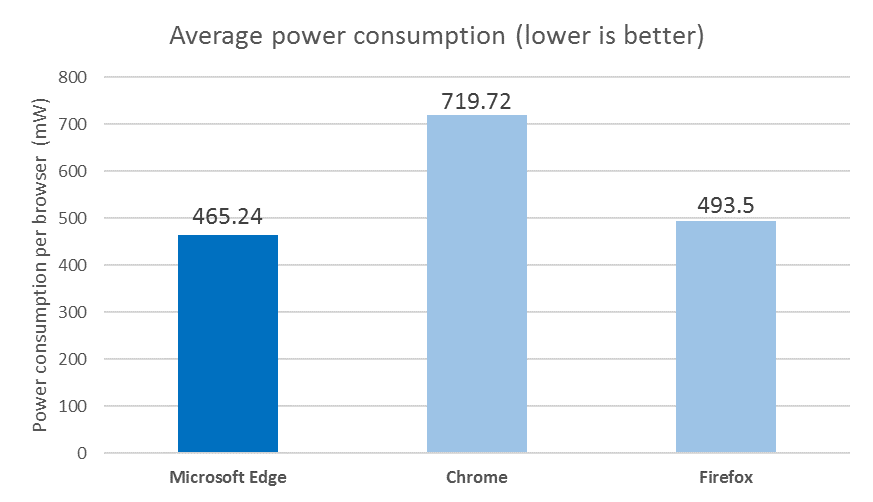Microsoft Tests Claim Edge Browser Beats Competitors In Power Efficiency Tests
Over the past few years, Microsoft has begun focusing on optimizing the power consumption of its web browsers. In a set of recent tests done by the company itself, the new Edge browser seems to be winning by a significant margin in power efficiency compared to its competitors.
Chrome kickstarted the new browser wars in 2008, and since then all the major browser vendors have become much more competitive in more areas than one. JavaScript, WebGL, and general rendering performance have all improved significantly because of this competition. Security has improved as well, and now Microsoft seems to want to take the competition in a new direction, and that’s the battle for browsing power efficiency.
In its recent tests, Microsoft took three types of measurements: one where it simply measured the power consumption of the tested devices (same model, same OS) with each running a different browser, another where it analyzed the data from its telemetry across Windows 10 machines, and finally it recorded all the computers running the same tasks until their batteries died. In all of these tests, Microsoft’s Edge seems to be the winner, usually by a significant margin.
In the first controlled lab test, all the browsers were given an identical workload. Edge used 2,068 milliwatts of power, whereas Chrome used 2,819 milliwatts to perform it. That means Chrome used 36 percent more power to do the same workload. Firefox used as much as 3161 milliwatts for the same task, which is a 53 percent higher power consumption than that of Edge.
Although Microsoft used power monitoring equipment to check the average power consumption while browsing the same websites on each browser, the company used Surface Books, which are likely highly optimized for Windows 10 and its browser. Therefore, it's not clear how much that optimization impacts the power consumption difference between Edge and the other browsers.
Microsoft also analyzed millions of Windows 10 PCs to see how much power they use when people browse the web on Edge, Chrome, and Firefox. This test shows Edge to be the winner again, although Firefox is a very close second, something not shown by the previous test, which was done only on Surface Books.
The test still shows Edge to have a significant lead on Chrome in average power consumption, though. However, comparing the browser in this way may not be an exact science. Many other apps could be running in the background, and perhaps Chrome users also tend to be power users that keep more tabs and applications open than the average Edge user. Therefore, it's hard to know just how accurate this test is, but chances are Edge could still come out a winner, even if by not as wide margin.
Get Tom's Hardware's best news and in-depth reviews, straight to your inbox.
Finally, in the last test, Microsoft used four Surface Book devices again to test Edge, Chrome, Firefox and Opera. The company streamed an HD video wirelessly and then kept it on a loop until the device's batteries ran dry. Chrome lasted only 4 hours and 19 minutes, Firefox lasted 5 hours and 9 minutes, and Opera hit 6 hours and 18 minutes, whereas Edge lasted 7 hours and 22 minutes, or 70 percent longer than the device running Chrome.
Doing the test on a Surface Book could've given Edge a big boost in power efficiency again. However, this result also shows Opera to be surprisingly efficient in this test, especially considering it’s based on the same Chromium software as Chrome is. It’s not clear whether that’s because Opera’s employees also optimized their browser for the Surface Book, or whether they added power optimizations that make Chromium significantly more efficient (although that should be seen in the first test as well).
Because the tests weren't done by an objective third-party, and because two of them were done on Surface Books, which are made by Microsoft and for which the company optimized its software, the tests should be taken with a grain of salt. However, it's also clear that Microsoft has made power efficiency one of its top priorities, so we can expect Edge to be relatively efficient compared to most browsers.
Chrome, on the other hand, is known to have some issues with high RAM usage because of its the per-tab sandboxing (a big improvement for its security). That can have a direct impact on power consumption. Google will have to resolve this issue eventually, if Microsoft, Apple and others keep putting pressure on its browser on this front.
In the meantime, Edge is expected to gain extensions as well soon, it already has decent sandboxing (although it doesn't seem to have matched Chrome's security yet), and with its new focus on power efficiency it may manage to sway a few more users to switch to it in the future.
Lucian Armasu is a Contributing Writer for Tom's Hardware. You can follow him at @lucian_armasu.
Lucian Armasu is a Contributing Writer for Tom's Hardware US. He covers software news and the issues surrounding privacy and security.
-
kiy0 So if we all act like anybody gives a damn about web browser "power consumption", I guess Microsoft will be happy.Reply -
JTWrenn It is the number 1 thing people do with a computer. That and write emails. So yeah probably pretty important.Reply -
captaincharisma sounds like MS is grasping at straws to defend the power drain windows 10 has on laptops over previous versions of windowsReply -
Bloob Interesting, but singling out any one parameter is always questionable (I realize this was marketing stunt). I know I have had problems with Edge not rendering, or rendering some things differently from other browsers, which is a concern. Of course, if the difference in performance and power-consumption is big enough then that would not matter as much, I guess.Reply -
captaincharisma Reply18153457 said:This is why I use Edge on my overclocked, water-cooled gaming PC.
so you can keep it cool enough until you are able to get liquid nitrogen :D
-
IceMyth What I understand from this is a troll article! First of all, Edge browser works only on Windows so for sure it is more compatible with the devices using Windows. Second thing, the comparison is not even effective as the other browsers tends to work on different platforms which means have to have all kind of things. Lastly, why didn't compare Mac Safari vs Windows Edge?Reply
Lastly, I love to see these kind of articles that has no purpose or proving something. If a study or comparison to be done it has to have the legitimate factors and parameters. -
Paco__ They need to be more concerned about their browser bogging down the system or stop working.Reply -
turkey3_scratch The problem is that Microsoft performed these tests. It's the same type of tricks used with AMD, for example, and Nvidia, when they showcase their new GPUs and the wonderful FPS numbers. Then there are always catches to all of it.Reply
Also, since this stuff is in the milliwatts, it really doesn't matter. It would take you probably 10 years straight of doing this task and saving 1W over Chrome to actually save $1.


